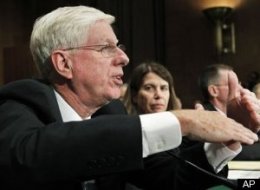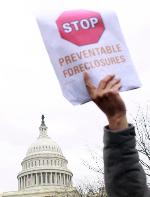The Nevada Supreme Court recently addressed a critical issue involving the Foreclosure Mediation Rules in the case of Leyva v. National Default Servicing Corp., App. No. 55216, Appeal from the Clark Co. District Court, A-10-600-651, 127Nev. ___, ___ P.3d ___ (Adv. Op. No. 40, July 7, 2011). The issue relates to the obligation of the lender to bring documents to the mediation that reveal who is the owner of the deed of trust and mortgage note. The Court’s ruling in this case will immediately arm homeowners with a serious weapon against the big banks and their servicers. Used in the correct way, many foreclosures may be stopped because of this recent opinion.
The State of Nevada Foreclosure Mediation Program was created in 2009. Facing foreclosure, the homeowner may request mediation through which a modification to home loan may be achieved. Once the homeowner requests mediation, no further action may be taken to exercise the power of sale until the completion of the mediation. The Nevada Supreme Court created the Foreclosure Mediation Rules (“FMR”) to govern those mediations.
The Leyva case presented the Nevada Supreme Court with an opportunity to interpret a critical portion of the mediation program requirements. NRS 107.086(4) and FMR 5 (8) (a) both provide: “In addition to the documents required by Rule 8 herein, the beneficiary [usually the lending bank] must bring to the mediation program the original or a certified copy of the deed of trust, the mortgage note and each assignment of the deed of trust and the mortgage note.” NRS 107.084(5) provides that “[i]f the beneficiary of the deed of trust or the representative fails to attend the mediation, fails to participate in the mediation in good faith or does not bring to the mediation each document required by section 4 or does not have authority or access to person with authority required by section 4, the mediator shall prepare and submit to the Mediation Administrator a petition and recommendation concerning imposition of sanctions against the beneficiary of the deed of trust or the representative, as the court deems appropriate, including, without limitation, requiring a loan modification in the manner determined proper by the court.”
The Nevada Supreme Court faced the issue of whether the lender’s failure to bring the required assignments and other documents as required by NRS 107.086(4) constituted bad faith under NRS 107.086(5). The answer to the question is not clear from the language of the statute or the FMR.
At the mediation in Leyva, the lender failed to deliver the assignments of the deed of trust and the mortgage note. However, the mediator did not find that the lender’s failure to provide the documents or other actions constituted a bad faith. Leyva disagreed and appealed the decision of the mediator to the Clark County District Court, Judge Donald Mosely. Ultimately, Judge Mosely agreed with the lender and entered an order finding that “there is a lack of showing of bad faith…”
Leyva appealed the decision of Judge Mosely to the Nevada Supreme Court. The Nevada Supreme Court issued its ruling on July 7, 2011 and rejected the lender’s arguments that it had participated in the mediation in good faith. The Nevada Supreme Court determined that since the statute used the word “shall” in reference to the obligation to bring certain documents to the mediation, strict compliance, not substantial compliance, was required. The Supreme Court went on the write “The legislative intent behind requiring a party to produce the assignments of the deed of trust and mortgage note is to ensure that whoever is foreclosing ‘actually owns the note’ and has the authority to modify the loan.”
The Supreme Court did not stop there. It felt compelled to then discuss what constitutes a valid assignment of deeds of trust and mortgage notes. By reaching this issue, the Supreme Court set the obligations for each lender with regards to their obligation to produce documents at mediation.
The Supreme Court then discussed the law regarding the assignment of a deed of trust. Since an assignment of an interest in land must be in writing, the Supreme Court concluded that “to prove that MortgageIt properly assigned its interest in land via the deed of trust to Wells Fargo, Wells Fargo needed to provide a signed writing from MortageIt demonstrating that transfer of interest.”
The Supreme Court then analyzed the method by which the interest in a mortgage note may be transferred and looked to Nevada’s Uniform Commercial Code – Negotiable Instruments. The Supreme Court wrote “[t]he obligor on the note has the right to know the identity of the entity that is “entitled to enforce” the mortgage note under Article 3, see NRS 104.3301, “[o]therwise, the [homeowner] may pay funds to a stranger in the case.” (Citation omitted.)
The Supreme Court rejected the arguments of Wells Fargo that mere possession of the mortgage note was sufficient. “[W]e conclude that Article 3 clearly requires Wells Fargo to demonstrate more than mere possession of the original note to be able to enforce a negotiable instrument under the facts of this case.” To meet its obligation under the Uniform Commercial Code, Wells Fargo had to show both endorsement of the mortgage note to it by the original lender and possession of the note.
Alternatively, Wells Fargo could have also demonstrated a transfer of the note to it. To demonstrate a transfer, Wells Fargo was obligated to prove that it was given the mortgage note for the purpose of enforcing it.
The Supreme Court then concluded that since Wells Fargo had failed to produced documents to demonstrate either a valid endorsement or transfer, Wells Fargo had neither demonstrated that it was entitled to foreclose on the property nor that it had authority to mediate with regards to the note. The Supreme Court, relying on its other opinion issued the same day, Pasillas v. HSBC Bank, 127Nev. __, __ P.3d __, Adv. Op. 39, July 7, 2011), ruled that the failure of Wells Fargo to bring the required documents “is a sanctionable offense under NRS 107.086 and the FMRs.” The Supreme Court then remanded the case to the district court for determination of the appropriate sanction.
This opinion seems to indicate that the “too big to fail” banks have met their match with the Nevada Supreme Court. The ramifications of this opinion will make the huge banks think twice before they allow the Nevada Supreme Court to hear any other issues concerning their foreclosure processes. This opinion arms homeowners, and especially their counsel, and creates an opportunity to stop the banks and their servicers from moving forward with a foreclosure with less that the full documentation proving their ownership of the mortgage note, and the authority to foreclose under the terms of the deed of trust.
The true scope and impact of the Leyva opinion on the foreclosure and mediation process in the Las Vegas valley will not be revealed any time soon. The banks will likely take any steps necessary avoid sanction as well as prevent the Nevada Supreme Court issuing any other opinions regarding the foreclosure process or the mediation program.
Thomas G. Grace, Esq.


 Last Wednesday, the
Last Wednesday, the Treasury officials confirmed that the Administration was examining
Treasury officials confirmed that the Administration was examining  The leader of a nationwide investigation of foreclosure fraud told homeowners Tuesday that the probe will have some serious consequences for bankers. To read the full article
The leader of a nationwide investigation of foreclosure fraud told homeowners Tuesday that the probe will have some serious consequences for bankers. To read the full article 



